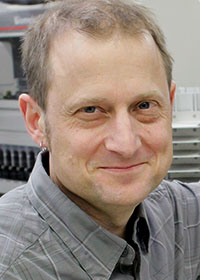Eric Weiss, PhD
Associate Professor, Molecular Biosciences; Judd A. and Marjorie Weinberg College of Arts and Sciences

Research Program
Cancer-Focused Research
Dr. Weiss's laboratory is interested in understanding how protein kinase signaling pathways coordinate cytoskeleton organization, membrane traffic, and gene expression to define cell architecture. The Weiss lab's present work is concentrated on understanding the functions of p21-activated kinases (PAKs) and the Ndr/warts family kinase Cbk1. The PAKs and Cbk1 play important roles in the cell cycle. Understanding how any protein kinase relays information requires identification of its regulatory partners and downstream phosphorylation targets. The Weiss lab is taking diverse approaches to this difficult problem. In addition to well-established genetic and biochemical techniques, this group is applying novel chemical genetic methods for in vivo and in vitro characterization of individual protein kinase functions and targets. The loss of normal cell architecture control is an important aspect of cancer progression, particularly in development of metastatic and invasive disease. In a broad sense, Dr. Weiss's work will help determine how morphological control mechanisms work in normal cells and how these processes become deranged in cancer cells, which, in turn, will identify targets for therapeutic agents. More specifically, Ndr/warts family protein kinases and associated proteins have recently emerged as an important link between cell proliferation control and morphogenesis.
